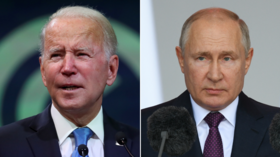Russia moving on from long-running policy of just extracting mineral wealth

When I was elected to the Russian parliament, a decade and a half ago, my colleagues put their trust in me to chair the Committee on Natural Resources, Environmental Management and Ecology. Since then, this body within the State Duma is called the “Committee on Ecology, Natural Resources and Environmental Protection.” On the surface, little seems to have changed – after all, every schoolchild knows that a change of name doesn’t always mean a change of function. But, in fact, there are nuances, and they are very significant.
The rebranding reflects the evolution of attitudes towards environmental issues in Russia’s highest legislative levels and in government – ecology has become one of the main priorities in domestic policy. Previously, the emphasis was on the natural resources that our country is so rich in, and the extraction of which, let’s be honest, is an important contributor to our national economy and well-being.
During decades of industrialization in the USSR, no one seriously thought about ecology as a system of relationships between man and nature. This was par for the course, not only in our country but all over the world. As a result of the barbaric exploitation of natural resources, the planet has turned into a huge dump, covered with the waste products of the consumer society. Due to the perspective of unbearable conditions for the human organism, the very existence of our civilization has been pushed to the edge of self-destruction.
However, we are not just upright mammals, but Homo Sapiens – individuals with intelligence and wisdom, able to learn lessons and build the future. In 2015, the heads of all UN member states signed the 17 Sustainable Development Goals (SDGs), which will run until 2030. This was a turning point in the formation of a new paradigm that involves a responsible attitude not only to nature, but also to the needs of people, regardless of their origin, property status and physical abilities.
In order to achieve these SDGs, we need both decisions at the political macro level, including the adoption of relevant laws and regulations, and the efforts of the economic entities themselves. As a response to this challenge, the ESG (Environmental, Social, and Corporate Governance) model appeared, encouraging business managers to solve environmental and social problems autonomously, of their own good will and to the best of their ability.
Following the ESG principles even brings dividends for countries and companies in the long run. According to a recent report from the World Economic Forum and Boston Consulting Group, the climate transformation will challenge heritage business models and create major opportunities in a wide range of sectors for eco-efficient companies that are actively adopting green technologies. Climate leaders can attract better talent employees, they play in higher-growth segments, save costs while cutting emissions, reduce their risk exposure, and reinforce their access to cheaper capital. As a result, these companies create higher shareholder value.
How do the ESG approaches apply to the specific social areas, for example healthcare? Hippocrates said: “The physician treats, but nature heals”. The founder of medical science taught that the disease is not dumped on one’s head, like a bolt from the blue, it is the result of long-term violations of the laws of nature. Gradually expanding and accumulating these violations suddenly erupts in the form of disease, but the suddenness is only imaginary.
In terms of economic activity, medicine itself is one of the most environmentally friendly industries. Modern construction development in healthcare is carried out according to LEED (Leadership in Energy and Environmental Design) standards, which regulates every part of a building’s operation, from ventilation to plumbing, and evaluates how efficiently resources are being used.
Of course, it is necessary to implement Lean Management, an innovative approach in healthcare, which is aimed at the rational use of energy capacities and waste recycling. The World Health Organization (WHO) recently published a report, which reveals that around 87,000 tons of personal protective equipment (PPE) distributed by the United Nations amid the Covid-19 pandemic, have generated a massive amount of waste. If we translate tons into the number of medical masks, it’s about 30 billion.
Meanwhile, modern technologies make it possible to successfully recycle medical waste and use it to produce materials that, among other things, help protect nature. So, chemists in Polytechnic University in Tomsk, Russia have invented a new superhydrophobic oleophilic fabric made from used masks. Due to its fibrous structure, it effectively cleans water affected by oil spills.
In the abbreviation ESG, medical organizations are more related to the letter ‘S’. The WHO defines quality of life as how individuals perceive their position in relation to goals, expectations, norms and concerns. It is determined by physical, social and emotional factors. The quality of life is also the degree of comfort of a person within himself and within his society.
The focus of modern medicine is not only the treatment of disease, but also the maintenance of health in a broad sense. The concept of Value-Based Health Care encourages attention to quality rather than quantity. It is no longer just a service industry that helps people who are experiencing problems with their physical or mental condition. This is a system that guarantees social well-being and a high quality of life. Thus, we are talking about the quintessence of the SDGs.
In 2019 the World Bank Group announced global initiative called Ethical Principles in Health Care. EPiHC is 10 principles that medical service providers, investors and other participants of the industry commit to adhere to. Among them are the commitment to implement high quality standards; protect the rights of patients; use personal data responsibly; save the environment; prevent any manifestations of discrimination and harassment. I printed this document and put it on the wall in my office like the Ten Commandments.
Modern medicine easily cures diseases that were considered fatal a hundred years ago. This happened thanks to the incredible progress of medical science, the invention of new pharmaceuticals, equipment and technologies. However, nothing can replace a humane attitude and compassion for a person who has suffered an illness. It was precisely formulated by the eminent psychiatrist, anthropologist, and public health service theorist Arthur Kleinman.
His worldview, based on decades of work in different countries of the world, prioritizes the concept of “caregiving”. Kleinman wrote: “Economists configure caregiving as “burden.” Psychologists talk about “coping,” health-services researchers describe social resources and healthcare costs, and physicians conceive it as a clinical skill. Each of these perspectives represents part of the picture. For the medical humanities and interpretive social sciences, caregiving is a foundational component of moral experience. By this I mean that we envision caregiving as an existential quality of what it is to be a human being”.
The key word that should define the relationship between physician and patient is “dignity.” Health professionals must respect the personality and individual needs of those who come to them with their trouble. The golden rule that they should follow is: treat others the way you want to be treated. This requires interaction with a person as a subject for dialogue and joint efforts. It is necessary to see in him a person, and not an object for manipulation and a client who brings money to the cashier.
Health care institutions should be focused on performing caregiving, assisting social services. After all, every person, without exception, interacts with physicians throughout their lives, from the moment of birth to death. Therefore, multifunctional clinics to become a school and incubator for social mediators, providing a variety of aid for the people, involving volunteer organizations. An impressive example is such a project, as White Cane, which was founded ten years ago in Ekaterinburg, Russia and has now transformed into the international movement Extrability (combine of “extra” and “ability”).
This is a unique social experiment, wherein its participants – people with various types of physical disabilities – gain indispensable experience of a positive attitude to life and full interaction with the outside world. The movement helps them to find an existential niche, decent job, realize their abilities and talents, and contribute to society. One of the most famous projects of Extrability is the Sails of the Spirit regattas and expeditions for people with disabilities, which are held in different regions of the world.
Our joint task is not only to financially assist people whose physical abilities are limited due to injury or illness, but also to change the attitude of society towards them. It is necessary to stop treating disabled people as sick and flawed. Often the abilities of these people – both in terms of intellect and practical labor skills – are much higher than of those who have excellent vision, hearing or musculoskeletal system. The new culture of Extrability should encourage us to change, among other things, the usual terminology. E.g., the word “invalid,” which in Latin means ‘weak,’ has practically become obsolete.
Fyodor Dostoyevsky, who’s bicentennial anniversary we celebrated last year, stated the biblical truth in a Mitya Karamazov’s monologue: “God and the devil are fighting there and the battlefield is the heart of man.” In order for good to win the battle with evil, we need to change consciousness and approaches. Therefore, today, at the peak of another outbreak of a pandemic, it’s time to reflect on the existential values of being. Sustainable development goals and ESG are not just about technologies, they are about dignity and caregiving.
The statements, views and opinions expressed in this column are solely those of the author and do not necessarily represent those of RT.















